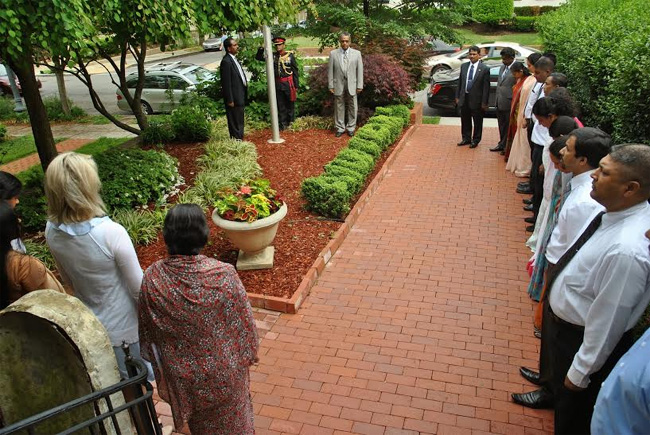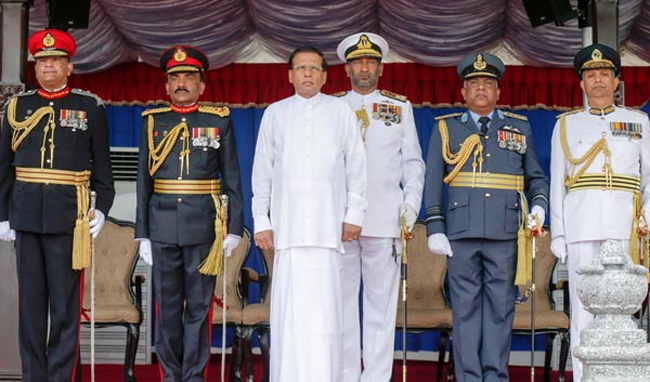
The Ambassador and the staff of the Embassy of Sri Lanka in Washington D.C. marked the sixth anniversary of the end of the armed conflict in Sri Lanka and the War Heroes Remembrance Day on May 19th, 2015, by observing a minute of silence followed by a ceremony.
In his remarks at this event, the Ambassador recalled the national commemoration of the War Heroes Remembrance Day, which was held in Matara. The significance of this year’s national commemoration lay in the importance placed on fostering reconciliation together with development efforts, to unite the hearts and minds of the different communities of Sri Lanka. The commemoration was reflective of the Declaration of Peace adopted at Sri Lanka’s 67th anniversary of independence on February 4th this year, which paid respect to all the citizens of the country of all ethnicities and religions who lost their lives due to the tragic conflict and to all the victims of violence since independence.
The Ambassador highlighted the remarks by President Maithripala Sirisena at the national commemoration in Matara stating that the new government’s policy is “development and reconciliation”, observing that “we cannot fulfill our expectations for reconciliation only through development. The reconciliation process primarily includes truth seeking, justice, eliminating fear and mistrust, building trust among the communities and rebuilding destroyed physical infrastructure. Hence, with the experiences of the war, we must understand the utmost need for a reconciliation process.”
Full text of the President’s address:

Today we commemorate a landmark day in our recent history. Today is the anniversary of the ending of the ruthless terrorism that plagued the country for nearly 30 years, ushering in peace, preserving the country’s territorial integrity, sovereignty and our national heritage. Today we commemorate our war heroes.
We all have experienced the barbaric nature of the conflict with the LTTE. When barbarism raised its head, humanity was lost, the truth was suppressed, peace was destroyed and the bloodshed cost us tens of thousands of lives. Terrorism is always inhuman. Our valiant security forces - the Army, Navy, Air Force, Police and Civil Defence Forces – went to battle in defence of the motherland, sacrificing their lives.
The war that began in the early 1980s was the worst tragedy our nation suffered for several decades. The country’s development came to a standstill. Hopes were shattered. However, the people and the security forces committed selflessly to win the war. All of you have the respect and gratitude of the nation. All members of the Army, Navy, Air Force, Police and Civil Defence Forces and all leaders of the country since the 1980s who gave leadership to end the war deserve the nation’s respect and gratitude. The service to the nation rendered by the security forces is invaluable. Today the government and all the people of Sri Lanka salute the members of the security forces for their service.
We must reflect on why this war lasted for nearly 30 years. It is important to study the developments in the decades preceding the war and action taken by governments of the day. All communities of the country, Sinhalese, Tamils, Muslims, worked together to gain independence in 1948. The true leaders of that period fulfilled their duties and responsibilities along with the people. In the 1930s and 1940s the independence struggle which culminated in the country’s independence in 1948 was carried out with the support of all ethnic and religious communities. After winning independence, there were many shortcomings in the way we proceeded to forge unity, coexistence and reconciliation among the communities. This resulted in discord among the communities, which in the end led to a brutal war.
On May 18th and 19th, 2009, with the end of the conflict we entered a post-war period of peace. Using our wisdom, experience and knowledge, we should reflect as to whether we have duly fulfilled our duties in the post-war period following the nearly 30 years of war. I do not believe that we have. Priority was given to the development of physical infrastructure, while reconciliation among communities was not a priority.
While the buildings, roads and other physical infrastructure that were destroyed were being rebuilt there was no reconciliation process in the post-war period to heal the broken hearts and minds. Therefore, the new government clearly states that our policy is development and reconciliation. We cannot achieve reconciliation through development alone. The reconciliation process primarily includes truth seeking, justice, eliminating fear and mistrust, building trust among the communities and rebuilding destroyed physical infrastructure. Hence, with the experiences of the war, we must understand the utmost need for a reconciliation process.
The last phase of the conflict began over water issues for farmers, with the disruption of the water supply at Mavil–Aru. This led to the final battle to achieve peace. The war that started over the waters of Mavil – Aru culminated on the waters of Nandikadal Lagoon.
We have to fulfill our duties and responsibilities by the people of Sri Lanka today as well as in the future. I know that the tri-forces, the police and the civil security forces are committed to the reconciliation process in keeping with government policies.
In carrying out our duties and responsibilities, we should work diligently to eliminate fear and mistrust and to foster mutual understanding among the people. To overcome challenges in the country, it is important that we evenly implement our slogan “development and reconciliation.” As we offer the nation’s respect and gratitude to you, as the new government, we clearly state that we will take steps for the wellbeing of our motherland, strengthening national security. In instructions given to the Heads of the Security Forces at Security Council meetings, action is being taken to implement a new national security plan. We are fully committed to preventing another conflict in the country.
We will not let terrorism raise its head again in the country. While we strengthen the process of development and reconciliation, we will place the utmost trust in the security forces. With regard to national security, we will take every step to strengthen the security forces and provide them with the necessary physical and human resources to carry out their duties.
Looking at different views and opinions held by political opponents of the present government we see that some hold very extremist views. These extremist groups attempt to create disharmony among the communities in our country. You can see this in other countries as well. While rejecting false propaganda of extremists, in keeping with government policy, we will take steps to strengthen national security and the security forces by providing necessary resources to fulfill their duties and responsibilities.
Bearing in mind that the War Heroes Remembrance Day is the day that brought peace to our country and the day on which the reconciliation process should be a priority, I believe that we will all fulfill our duties to the utmost.
To our beloved people, who made great sacrifices in the 30 year long war, we will commit to providing their due social welfare and benefits, in the development drive of our country.
On this great day peace dawned in our country. This is the day that we honour you; the day, which turns a new chapter in our country’s development and reconciliation. Everyone must unite for the development and reconciliation of the country. We must work in the interest of the country, in defence of its unity and territorial integrity and on behalf of all the Sri Lankan people and generations to come.
All of you have placed your confidence in our government. We must commit ourselves today to turn a new page to make this country a land of peace.
May the Noble Triple Gem bless you!
Embassy of Sri Lanka
Washington D.C.
21 May 2015




